6 Powerful Benefits of ChatGPT for HVAC Customer Support
May 9, 2025 - 13 min read

May 9, 2025 - 13 min read

As an HVAC contractor or HVAC business owner, you’re all too familiar with the pressure of providing fast, reliable service, especially during peak seasons.
Customers expect immediate help when their air conditioning breaks down in the summer; anything less can frustrate them.
This is the kind of situation no HVAC business owner would want their customers to suffer.
Traditional support is no longer sufficient.
Now, imagine quickly resolving subsequent questions, tackling technical issues, and delivering precise answers instantly with the power of AI-driven support. ChatGPT for HVAC customer support offers just that: faster, accurate responses that boost customer satisfaction, enhance efficiency, and keep your business running smoothly.
Continue reading to discover how ChatGPT is revolutionizing HVAC support and elevating customer service to the next level.
KEY HIGHLIGHTS
Next-Gen HVAC Customer Care
As HVAC businesses grow and customer expectations evolve, traditional support methods struggle to meet the demands of the modern customer. Here’s why:
These limitations demonstrate that traditional HVAC support is insufficient for today’s always-connected world.
Scroll up to learn how AI tools such as ChatGPT are helping to bridge the gap by providing accurate HVAC estimates and reliable support that both technicians and customers can rely on.
The HVAC industry has traditionally been one where customer service challenges are met with high operational costs and inconsistent service. With the rise of AI-driven customer support, HVAC contractors are transforming the way they engage with clients.
ChatGPT is leading this change by offering instant troubleshooting, personalized experiences, and at all times.
Let’s have a look at some of the key ways ChatGPT is transforming HVAC customer support:
How it helps:
HVAC issues don’t follow business hours, and neither does ChatGPT. By integrating ChatGPT as a live chatbot on your website, you can ensure 24/7 support for customer queries, even when your team is offline.
With round-the-clock availability, ChatGPT ensures customers receive immediate responses. It also offers instant troubleshooting assistance, helping to prevent delays in resolving the issue.
Solution:
ChatGPT can instantly analyze the customer’s query, offer troubleshooting steps, and provide helpful suggestions such as checking the thermostat, verifying air filter cleanliness, or resetting the system. It eliminates the need for customers to wait until business hours for assistance, ensuring customer satisfaction at all hours.
Example:
Imagine it’s 2 AM during a cold snap, and a customer’s furnace has malfunctioned. Rather than waiting for morning support, the customer reaches out via your website’s live chat. By integrating ChatGPT as a web chatbot, your site can handle urgent queries instantly, even when no one from your team is available.
Here’s what you can do 👇
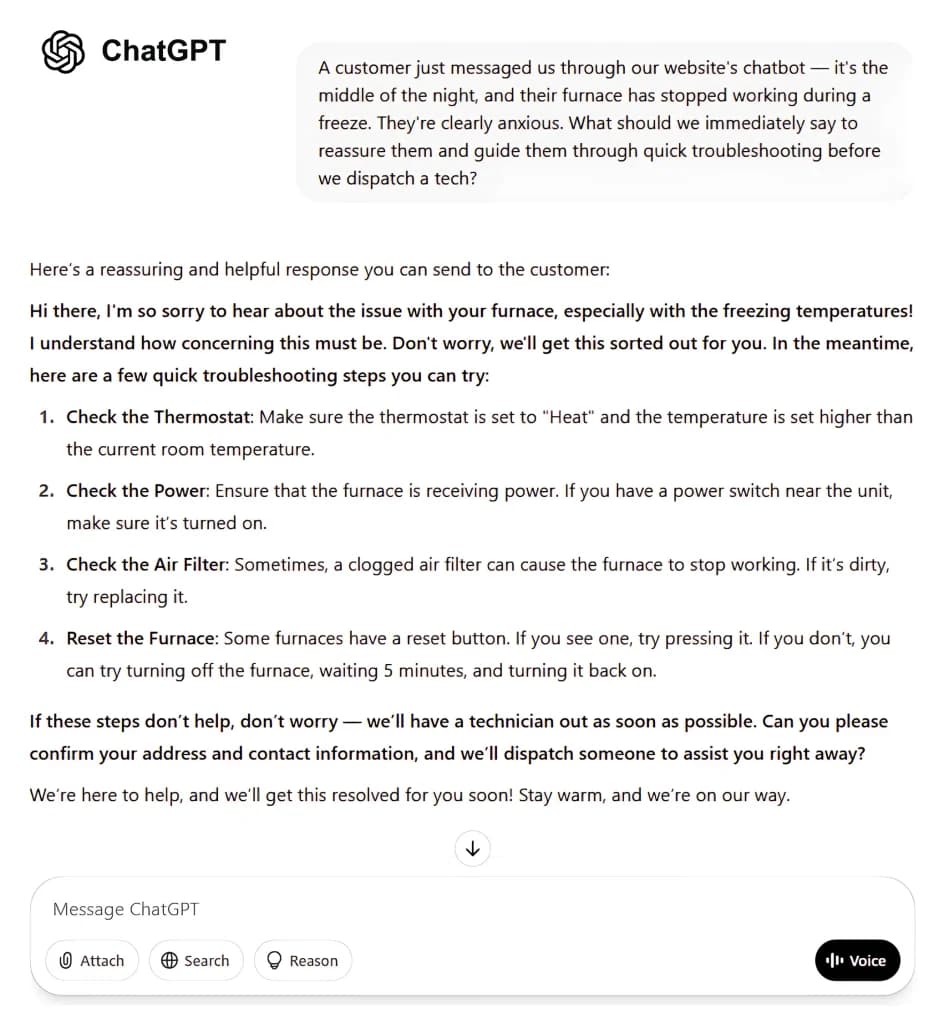
ChatGPT helps diagnose the issue by guiding them through simple steps, such as checking the pilot light or resetting the thermostat.
If the issue persists, ChatGPT provides a temporary workaround to keep the customer comfortable while noting the problem for future service.
How it helps:
HVAC businesses often receive routine inquiries about product specifications, maintenance schedules, and service pricing. ChatGPT can handle these basic queries, easing the workload on your human agents and allowing your technicians to focus on more complex, high-value tasks.
Solution:
To enable this, you can integrate ChatGPT in two practical ways:
Once integrated, ChatGPT delivers accurate, consistent responses whether it’s about HVAC system types, pricing details, or maintenance timelines, ensuring your customers get fast answers. At the same time, your team stays focused on service.
Example:
A customer wants to know the price of a new energy-efficient AC unit. ChatGPT immediately retrieves the relevant product details and provides pricing information, energy ratings, and maintenance tips.
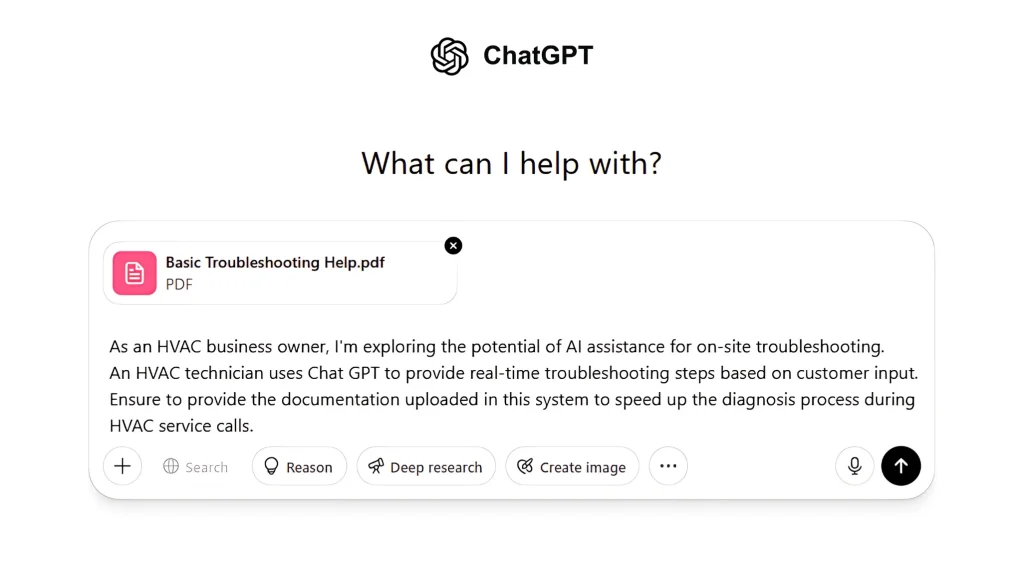
This quick and efficient exchange means the customer doesn’t need to wait for a live agent, freeing up your team to handle more pressing issues.
How it helps:
Customers expect personalized support when they reach out for help. ChatGPT can be integrated with your CRM to retrieve customer history, offering customized responses based on their previous interactions and system details.
Solution:
By reviewing the customer’s service records, ChatGPT can offer more accurate troubleshooting or suggest preventative measures based on the customer’s system model or past service issues. This personalized approach enhances the customer experience and helps build trust.
Example:
A customer contacts support with an issue on their 5-year-old furnace, which has been serviced multiple times.
When integrated with your existing HVAC CRM, ChatGPT can access past service logs to generate contextual support or suggest preventive steps, such as part replacements or energy-efficient upgrades, based on relevant client uploaded files.
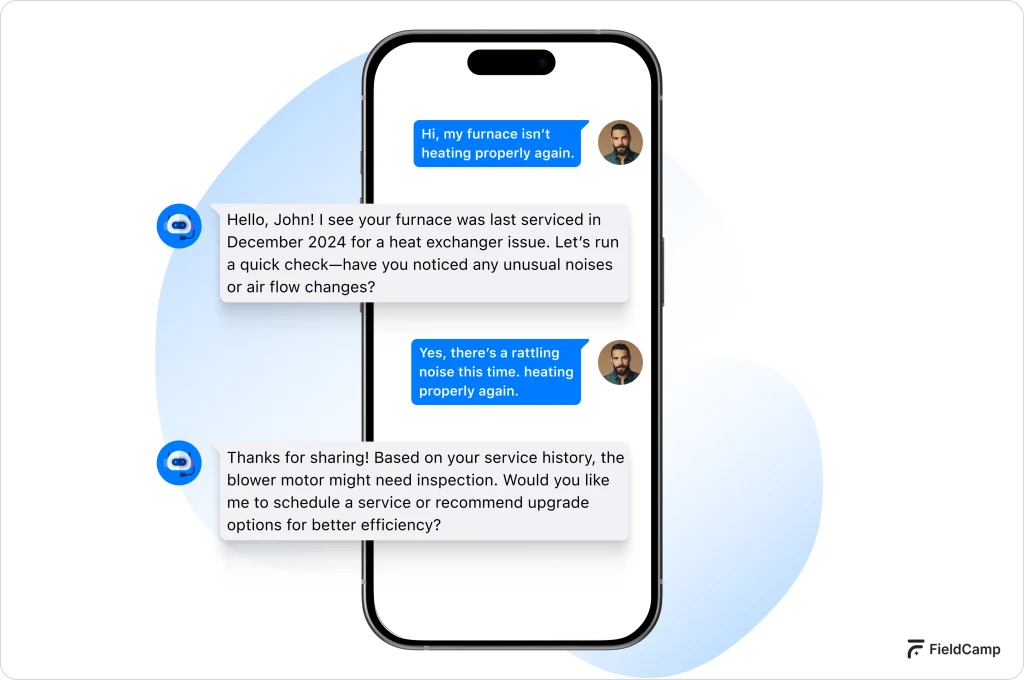
This level of insight creates a positive experience that feels more like a conversation with a knowledgeable technician.
How it Helps:
Regularly maintaining HVAC systems is crucial to their longevity and optimal performance. Yet, many customers forget to schedule preventive maintenance, leading to costly repairs later. ChatGPT can support this by framing friendly maintenance reminders and seasonal tips that encourage customers to take proactive steps.
Solution:
While ChatGPT cannot send reminders by itself, when integrated with CRM systems or customer databases, it can help draft personalized maintenance reminders or energy-saving tips.
For example, after six months without a service, your system can trigger ChatGPT to prepare a custom message, like:
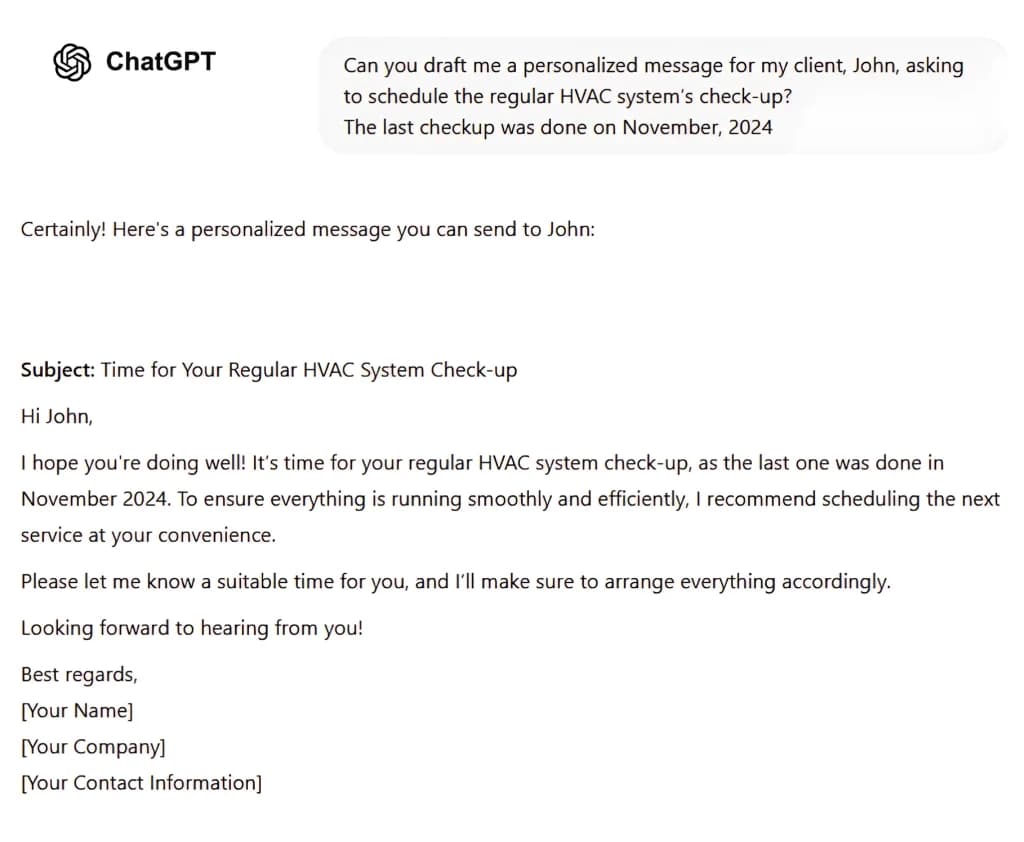
This crafted message can then be sent via email, SMS, or app notifications through your CRM or automation platform, keeping customers engaged without requiring manual effort from your team.
Bonus Tip:
Upload the common standard operating procedure followed in your business into your system. ChatGPT will utilize them to personalize advice even further, making customer interactions feel more genuine and helpful.
This is just the tip of the iceberg; our other HVAC blog dives deep with smart hacks and insights. If you’re keen on exploring the nitty-gritty, the dedicated section in that blog is a goldmine of valuable information.
How it helps:
Manually managing HVAC schedules isn’t just slow, it’s error-prone. With ChatGPT, you can create a basic chatbot that collects customer info, such as service type or preferred time. However, that’s where it ends; you’ll still need to manually update your work calendar, cross-check technician availability, and provide the job schedule details yourself.
Or…
You can skip the extra steps and use FieldCamp’s intelligent scheduling platform.
Just say the word (literally), and FieldCamp takes over, such as assigning jobs, scheduling based on availability, and factoring in technician skills so the right person gets the right job. It also helps in assigning multiple technicians and their jobs using auto-assignment for all.
It’s like having your own GPT, trained for HVAC operations, ready to act the moment you say so.
Example:
Customer calls and says, “I need plumbing services at 10 AM.”
You can write a prompt to the GPT or just speak using the command centre like: “Schedule a Plumbing Service Visit for Client at 10 AM to 12 PM for the Next 3 days”
How it helps:
As your HVAC business software evolves, the demand for customer support also increases. ChatGPT scales effortlessly to handle more customer interactions, without needing to hire additional staff.
Solution:
By managing a high volume of customer queries across multiple platforms, you enable your business to expand its support capabilities without increasing your support team, while maintaining a high level of service.
Example:
Your HVAC business is expanding and handling more customer requests than ever before.
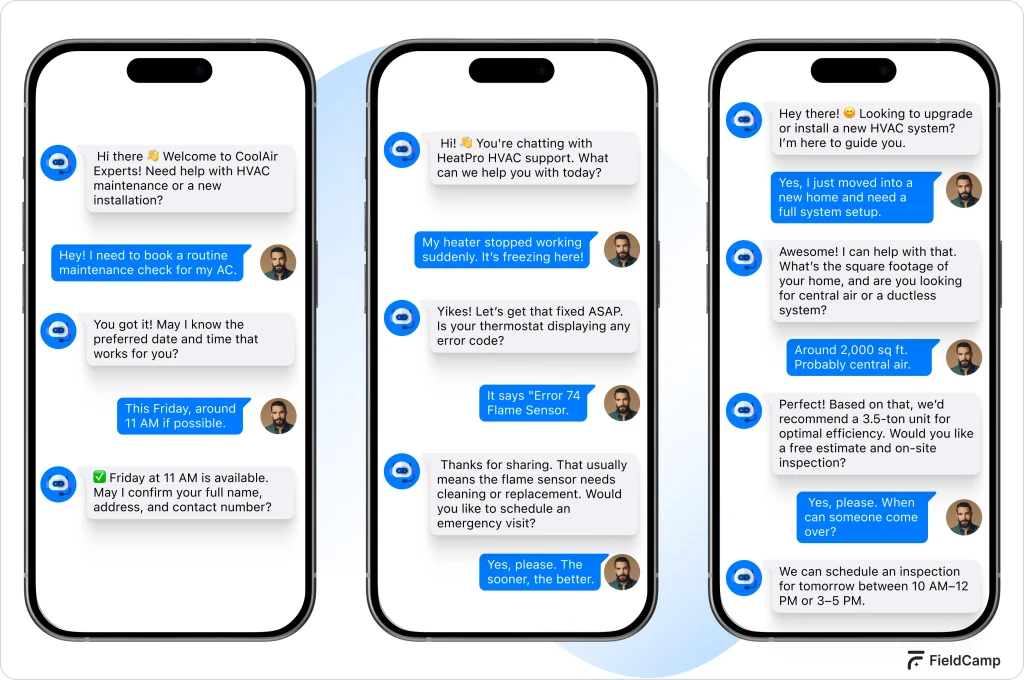
ChatGPT steps in to manage the influx, addressing basic queries and routine troubleshooting with the same quality as before, while your support team focuses on more complex cases. This scalability ensures consistent service as you grow.
English is a universal language, but it’s not everyone’s first language. For local HVAC businesses expanding into multilingual communities, language can silently become a barrier to trust.
How it helps:
ChatGPT can act as a translator, instantly translating customer queries into your technician’s preferred language. This ensures both parties are on the same page without requiring additional resources or a manual translation process.
Solution:
If you’re using ChatGPT for translation, you will need to manage the process manually. For every customer interaction, you would input the customer’s message into ChatGPT, manually translate it, and then pass the translated message to your technician.
Similarly, if the technician needs to reply in their language, you would need to manually input their response into ChatGPT for translation before sending it to the customer. While ChatGPT provides quick translations, it still requires human involvement to ensure accuracy and context.
Example:
A customer reaches out in French: “J’ai besoin d’une réparation pour mon système de chauffage demain matin.”
ChatGPT detects the French and translates it into English for the technician: “Customer needs a heating system repair tomorrow morning.”
The technician receives all the details in their language, ensuring they are fully prepared for the appointment without any confusion.

By integrating ChatGPT into HVAC customer support, businesses are setting a new standard for 24/7 assistance, faster issue resolution, and better customer engagement.
From offering instant troubleshooting for HVAC issues to helping organize service requests for smoother technician visits, every use case strengthens the customer experience. It’s not just about automating responses; it’s about enhancing customer satisfaction and maintaining consistent service quality, even outside of business hours.
AI-driven HVAC businesses gain a competitive advantage in responding, guiding, and resolving issues more efficiently. With natural language understanding at its core, it ensures support teams stay proactive, not reactive.
Here’s where it creates real impact:
As HVAC businesses face rising service demands and evolving customer expectations, AI tools like ChatGPT are stepping in as a practical ally.
From organizing support tickets and suggesting quick fixes to helping teams stay one step ahead, it’s not just about automation; it’s about getting things done faster, smarter, and with clarity.
This shift isn’t about replacing how things work. It’s about refining them. By adopting AI-powered HVAC support, teams can spend less time on manual tasks and more time addressing real problems.
Swift replies, Sharp solutions, Satisfied minds— That’s the HVAC edge where AI aligns.
AI in HVAC stands for Artificial Intelligence, which refers to intelligent systems that utilize machine learning and automation to enhance the operation of heating, ventilation, and air conditioning systems. It improves energy efficiency, facilitates predictive maintenance, and enables real-time diagnostics.
Many HVAC companies now rely on AI-powered HVAC software like FieldCamp. It helps with technician scheduling, job tracking, customer communication, field dispatching, and automating daily workflows using command-based AI.
Yes, you can! ChatGPT can help you generate a detailed HVAC maintenance checklist by understanding your requirements. For example, prompts like “Create a monthly HVAC inspection checklist for rooftop units” will give you a task-ready list instantly.